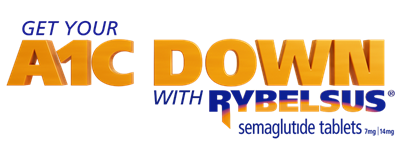RYBELSUS® is now approved to reduce the risk of major cardiovascular (CV) events in adults with type 2 diabetes who are at high risk for these events. Read the press release here.

RYBELSUS® patient shown is a paid spokesperson for Novo Nordisk.
There are updates coming to RYBELSUS®. Click here to learn more.
Get your A1C DOWN with RYBELSUS®
Once-daily RYBELSUS® is proven to significantly lower A1C.
Pay as little as $25 for up to a 3-month RYBELSUS®
prescriptiona
Check your insurance coverage and learn about ways to save.
aTo receive offer, 7 mg or 14 mg dose prescription must be for a 1-, 2-, or 3-month supply. For 3 mg dose, pay as little as $25 each month. Eligible, commercially insured patients with product coverage only. Maximum savings of $100 per 1‑month supply, $200 per 2‑month supply, or $300 per 3‑month supply. Eligibility and other restrictions apply.
Support to help you start and stay on RYBELSUS®
RYBELSUS® Connect offers support when and where you need it. Textb READY to 21848 to get started.
aTo receive offer, 7 mg or 14 mg dose prescription must be for a 1-, 2-, or 3-month supply. For 3 mg dose, pay as little as $25 each month. Eligible, commercially insured patients with product coverage only. Maximum savings of $100 per 1‑month supply, $200 per 2‑month supply, or $300 per 3‑month supply. Eligibility and other restrictions apply.
bMessage and data rates may apply. Check with your mobile service provider. Message frequency will be based on your selections. Text HELP to 21848 for help. Text STOP to 21848 to quit. See Terms and Conditions of Use.
What is RYBELSUS®?
RYBELSUS® (semaglutide) tablets 7 mg or 14 mg is a prescription medicine used:
- along with diet and exercise to improve blood sugar (glucose) in adults with type 2 diabetes.
- to reduce the risk of major cardiovascular events such as heart attack, stroke or death in adults with type 2 diabetes mellitus who are at high risk for these events
It is not known if RYBELSUS® is safe and effective for use in children
Please see Prescribing Information and Medication Guide for RYBELSUS®.
RYBELSUS® is a prescription medication.
You are encouraged to report negative side effects of prescription drugs to the FDA. Visit www.fda.gov/medwatch or call 1-800-FDA-1088.


